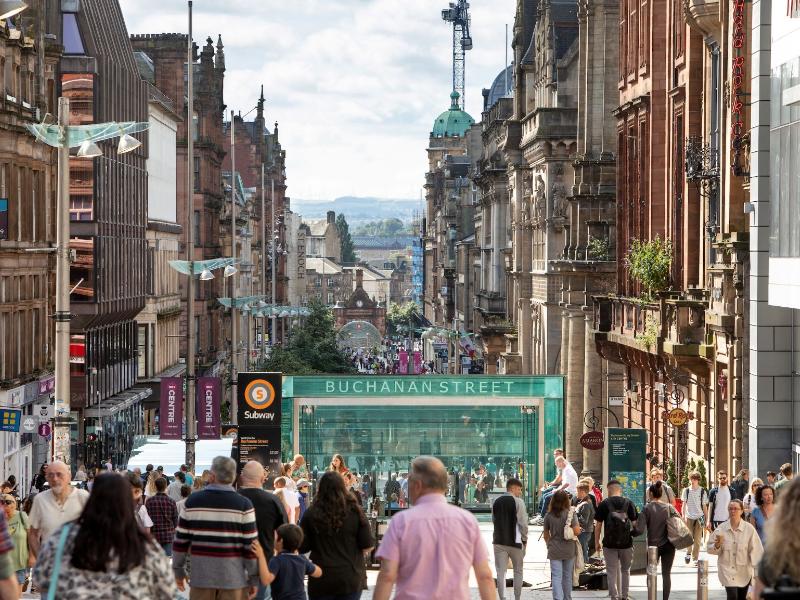Reinvest Glasgow tourist tax into housing and public services, says Living Rent

Tenants’ union Living Rent launched a petition yesterday that called on Glasgow City Council to reinvest money raised by its proposed tourist tax into housing and public services.
The levy, introduced in legislation by the Scottish Government, gives councils the ability to charge visitors for overnight stays, and could raise more than £12 million annually in Glasgow through a 5% tax.
Glasgow City Council is currently holding a public consultation on its proposal that a 5% visitor levy be introduced and that this should be spent on initiatives to promote tourism, including tourism marketing and a 1.5% reimbursement for short-term-let landlords.
Living Rent is collecting signatures on a petition to call for an increase in the tourist tax to 8.5%, and that the funds raised be invested in social housing by building social homes and purchasing empty properties.
It also calls for the funds raised to be invested in public services, bringing derelict buildings back into community use, and reopening community venues.
In the past decade and particularly since the pandemic, community centres, sports facilities and libraries across Glasgow have been closed permanently or indefinitely. Examples include Cardonald Library, Whitehill Pool, Yoker Sports Centre and Shettleston Community Centre.
Meanwhile, there are 36,000 people on waiting lists for social housing in Glasgow. 7,266 people are in temporary accommodation, including 2,765 children.
The Scottish Tourism Economic Impact Model’s latest figures show that visitors spent £2.35 billion in Glasgow in 2023, almost 50% more than in 2022.
In May of 2023 the Scottish Government announced the development of a visitor levy, or tourist tax. Councils will be able to generate funds from tourism by taxing overnight accommodation, once they have consulted local communities and businesses. This plan is part of a wider commitment of the Scottish Government to hand more power to local councils.
So far plans for a visitor levy have been introduced in Edinburgh, the Highlands, and Aberdeen, which is proposing a 7% tax.
The City of Edinburgh Council has already committed to spending £5m per year from their visitor levy to borrow a further £150m that they will invest in council and affordable housing.
Ian MacCorquodale, member of Living Rent Glasgow, said: “This tourist tax is a huge opportunity for the council to invest in the housing and services Glasgow badly needs.
“Contrary to what the council says, Glasgow is not thriving. One by one our community facilities are being gutted, there are over 36,000 on social housing waiting lists and over 3,000 children are stuck in temporary accommodation. We can’t go on like this.”
“Already this year the council have hiked council tax up 7.5% to pay for the council’s funding gap and chief executive salary increases, all while we continue to see cuts to public services.”
He added: “Tourists are welcome in our city, but the council should invest in improving our city for the people that live here, not just for the benefit of big businesses.”
Chris Mitchell, GMB convenor, said: “The council must invest in public services and infrastructure that benefit the residents and workers of Glasgow, not just people passing through. It’s a slap in the face for the council to spend £12m on tourism when Glasgow has seen years of council cuts.
“From roads to parks to public services and especially in our cleansing services, we need investment to ensure we have cleaner and safer streets, not more superficial fixes when events like COP, the Cycling World Championships, or Commonwealth Games come to town. Glasgow should be a city where we can be proud to host visitors, and that will only happen if the council put their money where their mouth is and fix Glasgow’s crumbling infrastructure.”
Yana Petticrew, Unite Hospitality Vice chair and industrial officer, said: “It’s appalling to see that the hospitality and tourism workers who foster and sustain Glasgow’s social and cultural spaces are being pushed out of their homes by skyrocketing rents, gentrification, and the lack of affordable housing.
“As low-paid, precarious workers who are often on minimum or zero-hour contracts, it can be a struggle to pay rent and live in the areas that we work in. Many of us are now being forced to live miles away from our workplaces, where we are expected to travel to and from outside the hours of public transport, as we are continuously priced out of Glasgow.
“The tourist tax should be invested into affordable housing to ensure that workers in the hospitality and tourism industry can continue to live and work in the city we cultivate through our labour, and we must see the material benefit of this increase in funding go towards the workers, not the bosses.”








